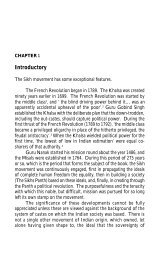Fundamentalism and the Sikh Religious Tradition by T.N. Madan
Fundamentalism and the Sikh Religious Tradition by T.N. Madan
Fundamentalism and the Sikh Religious Tradition by T.N. Madan
You also want an ePaper? Increase the reach of your titles
YUMPU automatically turns print PDFs into web optimized ePapers that Google loves.
state, morals, education, etc., should be independent of religion. In short, Secularism not<br />
only envisages complete control of <strong>the</strong> empirical life of man, but also seeks to evolve an<br />
ethics that is independent of religion, but makes for cohesion in society. But, in <strong>the</strong> last<br />
about three hundred years, since Secularism has its survey in <strong>the</strong> empirical life, it has<br />
been unable to create an ethics, even for <strong>the</strong> individual state, much less a universal ethics<br />
that should embrace humanity as a whole.<br />
After <strong>the</strong> Reformation <strong>the</strong> national slate came into being with <strong>the</strong> Christian<br />
Church becoming a wing of <strong>the</strong> State, Catholicism went on <strong>the</strong> decline, <strong>and</strong> lost its overall<br />
supremacy in <strong>the</strong> Western world. Science <strong>and</strong> <strong>the</strong> Industrial Revolution, gave major<br />
blows to religion, <strong>and</strong> many a thinking person felt it was really superfluous for <strong>the</strong><br />
empirical life of man. Until <strong>the</strong> first quarter of <strong>the</strong> century, Science generated consider<br />
able optimism for <strong>the</strong> future of man, <strong>and</strong> his capacity to create his own destiny. The two<br />
World Wars, <strong>and</strong> especially <strong>the</strong> events following <strong>the</strong> Second World War, have, apart<br />
from shattering many hopes, created serious doubts as to human capacity to live with his<br />
neighbours.<br />
Toynbee laments that for <strong>the</strong> last about three hundred years we have been in <strong>the</strong><br />
grip of <strong>the</strong> idea of a national state, involving a rapid narrowing of our vision, affinities<br />
<strong>and</strong> affiliations. He observed; "The secularisation of <strong>the</strong> Western civilisation in <strong>the</strong><br />
Seventeenth century, so far from producing a stable way of life, raised <strong>the</strong> question : what<br />
is going <strong>the</strong> Fill <strong>the</strong> temporary spiritual vacuum that this deconsecration of Western life<br />
has created in Western souls ? Alternative attempt" to fill this vacuum have constituted<br />
<strong>the</strong> unstable spiritual history of <strong>the</strong> Western world during <strong>the</strong> last 250 years." "The<br />
transfer of allegiance from <strong>the</strong> Western Christian church to parochial Western Secular<br />
state, was given a positive form borrowed from <strong>the</strong> Graeco-Roman civilisation <strong>by</strong> <strong>the</strong><br />
Rennaissance." "On this political plane <strong>the</strong> Rennaissance revived <strong>the</strong> Graeco-Roman<br />
worship of parochial states as goddesses. This unavowed worship of parochial state was<br />
<strong>by</strong> far <strong>the</strong> most prevalent religion in <strong>the</strong> Western World in AD 1956,"'U Toynbee views<br />
that Secularisation having replaced great world religions, has led to 'nationalism,<br />
communism <strong>and</strong> individualism,' systems that are "all three equally impersonal <strong>and</strong><br />
dehumanising.'""<br />
In <strong>the</strong> empirical field <strong>the</strong> facts of life are too ugly <strong>and</strong> obvious to ignore.<br />
Secularisation in this century created two monsters. Hitler <strong>and</strong> Stalin, who could<br />
sadistically <strong>and</strong> cynically destroy, 6 millions <strong>and</strong> 12 millions respectively, of <strong>the</strong>ir own<br />
peaceful citizens. And, <strong>the</strong> unfortunate tragedy is that <strong>the</strong> tribe of mini Stalins is far from<br />
being extinct. The drum-beating for <strong>the</strong>m is too loud to permit <strong>the</strong> faint voices of sanity<br />
to be heard. Hiroshima <strong>and</strong> Nagasaki are stark realities of modern life. Since 1914, apart<br />
from <strong>the</strong> two world wars, we have fought over four dozen hot wars, involving, in this<br />
century, <strong>the</strong> destruction of more human beings than did <strong>the</strong> rulers of various civilisation<br />
in all <strong>the</strong> earlier wars of man. Despite all talk of disarmament we are spending about a<br />
1000 billion Dollars on armament each year. No wonder, Toynbee strikes a dismal note<br />
about secularisation <strong>and</strong> <strong>the</strong> doubtful role of our scientific genius.<br />
"After having been undeservedly idolised for a quarter of millenium, as <strong>the</strong> good<br />
genius of mankind, he has now suddenly found himself undeservedly execrated as an evil<br />
genius who has released from his bottle a jinn that may perhaps destroy human life from<br />
earth. This arbitrary change in <strong>the</strong> technician's onward fortunes is a severe ordeal, but his<br />
loss of popularity has not hit him so hard, as his loss of confidence in himself. Till 1945
















